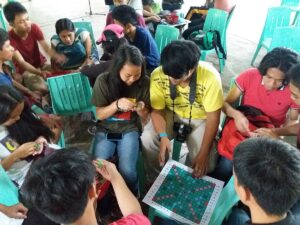At about this time during the semester, first-year students hit “the wall.” Though not a literal wall, it can be no less daunting to face and overcome. For the purposes of this blog post, “the wall” refers to the fact that their level of social interaction or interpersonal relationships between two or more people has reached a peak and, in some instances, has become more than they can handle. Have you hit the wall? Let’s use sociological key terms to find out.
When a person starts a new endeavor like college, their position or rank within the social system, i.e., social status, is relatively low. The term freshman means novice or newcomer and describes those with less experience or social status than others in the institution. For the vast majority of students, their place at the college or university is based on achieved status and earned social status based on merit. They earned their place at their school because of their effort and hard work in high school. This is in contrast to ascribed status, assigned social status based on characteristics such as sex, race, and age. While people often assume that affirmative action admissions considering race and sex are examples of ascribed status, legacy admission based on family heritage or financial donation also qualifies. Regardless, most first-year students are in the same boat. They are new on campus and need to transition from operating in a family and high school scale primary group, intimate, face-to-face, long-lasting associations, to the large-scale, impersonal, task-focused, and time-limited associations or secondary group of college.
Part of the transition from primary to secondary groups involves carving out a niche of friends and associates. This usually means joining social groups comprising two or more individuals connected by common bonds and shared social relations. Academic, cultural, artistic, and political clubs are examples of social groups. Others include fraternities and sororities, sports teams, and professional organizations. However, joining these groups comes with a price. While there might be nominal (or not so nominal!) group dues, membership often comes with a social role and expected patterns of behaviors for specific statuses and positions. For some, this could mean taking on a position in the organization like president or events coordinator, but at the very least, there is the expectation that you will attend meetings and participate regularly.

During the early days of the semester, students typically join multiple groups and enthusiastically agree to various roles. However, they quickly encounter role strain, incompatible demands and expectations within a single role. Their role as students allowed them to join the various groups and organizations on campus. Yet being a student and a member of several groups may become overwhelming as their academic demands steadily increase throughout the semester. Add to this the fact that the average college student works as much as 33 hours per week, and you can see how quickly role conflict, competing demands resulting from two or more statuses, can become an issue.
So, what do students do in this situation? For most, it requires some level of role exit, the process of disengaging from significant roles. This is why participation in many student organizations tends to go down over the course of the semester. Between papers, projects, exams, and work, students come to realize that in college, their role as students is their master status, the social position central to their identity. Without being academically successful, participation in the on-campus groups and organizations isn’t possible.

Thomas theorem contends if we think something is real, then it is indeed real to us. If you feel overcommitted and have hit “the wall,” then you probably have. What can you do about this? Look at your various roles and decide 1) what you have to do, 2) what you want to do, and 3) what you are doing for no real reason other than it sounded good at the time. There is no shame in reassessing your commitments and adjusting your level of participation in social groups. In the end, your ultimate goal is graduation. Keep your eyes on that prize, and you are sure to overcome the wall.
Thompson is a co-owner of UITAC Publishing. UITAC’s mission is to provide high-quality, affordable, and socially responsible online course materials.
Images used in this blog:
1. “Serpentine wall UVa daffodils 2010” by Karen Blaha is licensed under CC BY 2.0. This image has not been altered.
2. “College students play Dama Nin Tataramon” by Irvin Parco Sto. Tomas is licensed by CC BY 4.0. This image has not been altered.
3. “Dickinson College 18 College Classroom” by Tomwsulcer is licensed under CC0 1.0 Public Domain Dedication. This image has not been altered.




